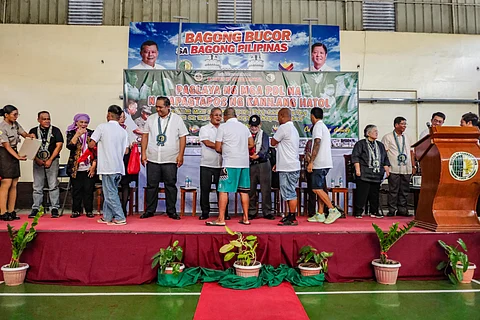
- NEWS
- the EDIT
- COMMENTARY
- BUSINESS
- LIFE
- SHOW
- ACTION
- GLOBAL GOALS
- SNAPS
- DYARYO TIRADA
- MORE

After President Ferdinand Marcos Jr. appointed former Armed Forces of the Philippines Chief of Staff Gregorio Pio Catapang Jr. on 21 October 2022, upon the suspension and dismissal of Bureau of Corrections (BuCor) Director General Undersecretary Gerald Bantag, the new official of the detention facility faced a daunting task.
The President appointed Catapang as the Officer-in-Charge and eventually as the full-time Undersecretary/Director General of the Bureau of Corrections.
The biggest challenge that he faces, according to Catapang, is erasing the “50 years of neglect” of the prison facility.
Despite the daunting tasks ahead, Catapang is not about to retreat; instead, it makes a strong resolve to face the challenges head-on, as this is also one of the marching orders of Justice Secretary Jesus Crispin Remulla.
Aside from the drug problem inside different jail facilities, Catapang also encountered other challenges that affected the day-to-day operations of BuCor.
Being a former soldier, Catapang formulated a framework that would guide BuCor towards the future.
He introduced Doctrine, Organization, Training, Materiel, Leadership Personnel and Facilities (DOTMLPF Framework), aiming to enhance the bureau’s capabilities and responsiveness in a rapidly evolving social landscape.
Leadership inspired by vision
Catapang, by crafting the DOTMLPF Framework, stated that the future of BuCor hinges on visionary leadership that embraces reform and innovation while prioritizing the reform of persons deprived of liberty.
The vision aims to transform the operational framework of Bucor to ensure it is aligned with current standards, while setting a benchmark for reformative justice.
Doctrine is redefined within the framework, shifting its focus from confinement to reformation, restorative justice, and community reintegration, involving a thorough revision of BuCor’s policies to ensure they are aligned with international human rights standards and evidence-based practices.
Organization is a structure within the framework that aims to foster agility and enhance coordination, ensuring that all levels of leadership are well-equipped to navigate the complexities of modern correctional work effectively.
Training plays a pivotal role in equipping BuCor personnel, as it is considered essential for meeting the challenges of achieving the agency’s objectives.
Catapang emphasized the importance of the continued professional development going beyond traditional safety protocols, integrating essential areas such as resolving conflict and awareness of mental health into the training programs.
Materials are needed to upgrade infrastructure and technology, laying the groundwork for creating an environment conducive to rehabilitation. This includes incorporating smart technologies and innovative solutions, such as virtual education and telemedicine.
Factors that ensure future
Leadership and education are also essential to the future of Bucor, as this will nurture effective and accountable leadership, which is crucial as Catapang envisions a culture of leadership grounded in transparency and ethics, fostering the growth of leaders who prioritize both order and reform.
Personnel support is deemed essential; thus, a focus on building a resilient workforce is ongoing through competitive compensation and mental health support.
And finally, facilities modernization is deemed essential to ensure safe, humane, and reformative environments, as well as promote the well-being of PDLs, which would pave the way for their successful reintegration into society.
Catapang said that through these strategic directions, the BuCor is ready to redefine its mission and impact in the realm of correctional reform.
Justice must be restorative
On the other hand, the current reformation program also involved restorative justice, a progressive shift away from punitive measures toward a holistic approach that emphasizes healing and accountability.
This will be attained by dialogue among PDLs, victims and community members.
For Catapang, restorative justice programs cultivate understanding and promote a more compassionate environment conducive to genuine reform.
Technology also plays an integral part in the current BuCor leadership’s continued drive, underscoring its commitment to modernizing the correctional facility.
Catapang adopted advanced technological solutions to enhance security and improve educational opportunities for PDLs.
BuCor, by implementing cutting-edge surveillance systems and biometric identification, aims to maintain safety while minimizing human error.
Also introduced as part of a more comprehensive reform program are virtual classrooms and online training programs that have revolutionized access to education within its facilities, ensuring that all PDLs can develop essential skills irrespective of their circumstances.
The said initiatives of Bucor are aimed at ensuring PDLs for their successful reintegration to society and also acknowledge the role of continuous learning in personal transformation.
